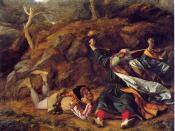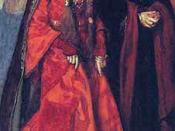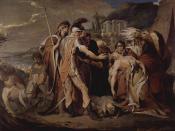King Lear was written around 1603-06. A contextualised political reading interprets King Lear as a drama that gives expression to crucial political and social issues of its time: the hierarchy of the Jacobean state, King James' belief in his divine right to rule, and the political anxieties that characterised the end of Queen Elizabeth's reign: fears of civil war and division of the kingdom triggered by growth of conflicting fractions and a threatening underclass.
Like all writers, Shakespeare reflected the world he knew. The ancient Britain the pseudo-historical Lear lived in contained anachronistic references to aspects of Jacobean life, such as eel pies and toasted cheese. Kent calls Oswald a 'base football player', evoking the class assumptions of the times. More significantly, King Lear reveals the conditions and preoccupations of Jacobean England in terms of politics, social change, justice, religion, madness, and the natural order.
Politics
Watching the play, Jacobean audiences would detect many resonances with their own socio-political climate: troubled and uncertain times as Elizabeth's reign draws to a close and James ascends the throne - as the Tudor dynasty gave way to the Stuarts.
Poverty, food shortages and unemployment were commonplace; Bedlam beggars were troublesome, roaming the countryside pleading for charity. These social features are explored by Shakespeare via Lear's madness and the character of Edgar-turned-poor-Tom.
The Cordelia-led French invasion may have sparked memory of the Spanish Armada of 1588.
Lear's character contains parallels to King James's. James, like Lear, believed in his own divine right to rule, and deemed it blasphemous to question the King's action. The divine right of the King was the prevailing sentiment reinforced by law, and Lear's unwitting decision to abdicate ruptures the divine and natural order
Shakespeare makes subtle allusions to James' profligate behaviour - which held significance for Jacobean audiences.


